Peter MALONE
Single Moms Club, The
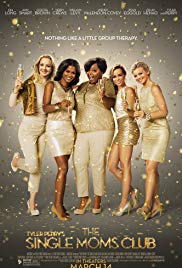
THE SINGLE MOMS CLUB
US, 2014, 111 minutes, Colour.
Nia Long, Wendi Mc Clendon- Covey, Amy Smart, Zulay Henao, Cocoa Brown, Ryan Eggold, Tyler Perry, William Levy, Terry Crews, Katherine Shepler, Cassie Brennan, Massai Z.Dorsey, Vanessa Velasco, De Vion Harris.
Directed by Tyler Perry.
Over the years, Tyler Perry has directed a great number of films with African- American stories, often with a strong emphasis on female characters. He had a series of films, comic, with his disguising himself as Madea.
Four women are introduced, very different characters, different social status. However, their children have misbehaved at school and are being summoned to the principal's office, shocked at the behaviour of their children, the mothers agreeing to collaborate in a fundraiser to make some atonement.
The strength of the film is in the portrayal of each mother, some friendship, some racial prejudice, some snobbery. There is some attention to the children but more on the mothers.
Finally, the mothers agree to pool their energies, forming a club, each mother taking some responsibility for supervising the children while the others are able to go out. However, there is an alarm when one of the children is missing which, is to do with a broken marriage and is eventually resolved.
One mother is a businesswoman, inherently racist and snobbish. Her friend has several children but is separated, cannot afford the maid, and feels unable to cope with her family. Another woman is the prospective author who, eventually, achieves some success by writing up the story of the motherclub. The fourth mother, African- American, a large genial but irascible lady, serves as a catalyst for each of them to check their own attitudes.
1. The title? Topical? The range of single mothers? Bring up their children? Life at home? At school? Professional lives and coping?
2. The city, the range of professions, offices, courts, diners, schools? Meetings? Homes and the club members minding the children? The range of outings, clubs, cinemas? The musical score?
3. The situation, the prestigious school, the graffiti, the smoking, issues of suspension? Authorities wanting to meet the mothers, their being summoned? The threats, suspension, the mothers providing for a funding occasion?
4. The first part of the film introducing the mothers? Jan, editing, the 17 years, interactions with the boss, the young unmarried man wanting the partnership, his taunts to her, her harsh manner? May and her visit with the manuscript? Issues of racism? Her daughter and the absence of a father, her daughters sullen responses? Demands? May, her husband and his drug problems, her son wanting to live with his father, going off to meet him? May is author, turned down by Jack, the car breakdown, the help from TK, is bringing her purse back, coffee with him, the bond, is divorce, his two sons, taking fishing? Hillary, her husband, owning the house, the divorce, wanting to limit alimony and support, her three children, Kristina the maid, and not coping, her daughter and her first period, not knowing, finance, firing Kristina, finding it hard to cope with the children? The attraction of the next-door neighbour, Jan on the phone and prompting her? Esperanza, the affair with the bartender at the diner, secret from her husband, Veronica, relationship with her mother, problems at home? Lydia, at the diner, no husband, hard work, Branson, his attentions, winning, continually being rebuffed, persevering, the wreath, her boys, the two in jail for 25 years, protecting her son and sending him to the prestigious school, his reactions, conscientious but surly?
5. The women meeting with the principal, the reactions about their children, the continued discovery of the not communicating with their children? The idea of the single mom's club? The meetings, difficulties, Jan and her surliness and insults towards Lydia, racism? Snobbery? The project for the funding? May asking TK to help? Hillary asking the neighbour and his designing the enchanted Castle? The various meetings? One member minding all the children on the other going for outings, the range of outings and enjoyment?
6. The men, TK and his being helpful, his children, taking Rick fishing? The barman and the relationship, Branson and the comic touches?
7. The crisis, Rick disappearing, may upset, Hillary distraught, the search? Rick returning, explaining into gone to his father, the past and his father not picking him up from school, this time the meeting, his father taking his money and goods, pawning them? Rick walking home?
8. The various stages of the children reconciling with their parents, talking, understanding, loving?
9. A film for the popular audience, those who could identify with the characters and the situations, learning, being encouraged?
Canterville Ghost, The/ 1996
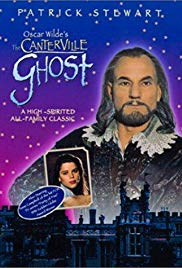
THE CANTERVILLE GHOST
US, 1996, 92 minutes, Colour.
Patrick Stewart, Neve Campbell, Joan Sims, Donnell Sinden, Cherie Lunghi, Edward Wiley, Leslie Phillips, Daniel Betts, Ciaran Fitzgerald, Raymond Pickard.
Directed by Syd Macartney.
This is a story by Oscar Wilde. The film version became something of a classic in the 1940s with Charles Laughton is the ghost, Margaret O’Brien? is the little girl. It is the story of a haunted house, the story of the ghost and his misdeeds centuries earlier and is being condemned to want. He can be liberated by the actions of a young girl.
Patrick Stewart enjoys himself as the ghost in this version, having the opportunity to do some Shakespearean recitations in full theatrical verve. The girl in this version is somewhat older, played by Neve Campbell, just as she was about to star in the Scream series. Cherie Lunghi plays her mother and there are cameos as the housekeepers by veteran stars Joan Sims and Donnell Sinden.
The film is designed for family appeal, young boys identifying with the two sons and their mischievous enjoyment as the
1. The popularity of the story? Written by Oscar Wilde? The variety of versions over the decades? This film made for television and family audiences?
2. England, the 1990s, the British countryside, the Castle, the vast interiors, the gardens, the burial place of the angel statue, riding in the countryside? Trains, cars, atmosphere? The musical score?
3. The Americans in England, Hiram and the grant, the scientist, his research? Lucille, her support and love, the two boys and seeing it as an adventure, Jenny and her resentment, having to leave her friends, upset? In the past clashes with her father?
4. The British situation, landed gentry need of money, renting the castle? Sir Simon and his welcome, happy to get the money? Mr and Mrs On the, servants, old British style, their manner, loyalties?
5. The family settling in, Hiram and his visit to the pub, post office and police and vet et cetera all in one? The men betting that the family would move out? Previous families moving out?
6. The ghostly atmosphere? The portraits? The sounds in the night? Hiram and his disbelief in ghosts, belief in science? His accusing Jenny playing pranks, wanting to be sent home?
7. The appearance of the ghost, his manner, scaring people, seen only by the boys and Jinny, Hiram walking through him? The boys in the scares, their belief? Jinny, reading the history, learning more about him, Sir Simon and the 16th century? His sad portrait?
8. The secret door, Jinny finding Sir Simon, is appreciating her screen, the conversation, learning more about him?
9. Francis riding by, the encounter with Jinny, the attraction, coming to dinner, saying he had seen the ghost? The discussions? Jinny and the attraction? Wanting to stay? Francis and his helping Jinny, the idea of playing Hamlet, Sir Simon is the ghost?
10. Sir Simon’s story, jealous if his wife, hounding her, her killing herself, the lives lies of the friend? Sir Simon Ward up, starving to death? The legend of how he could be rose redeemed by a young girl? His stories about knowing Shakespeare, the ghost walking, the rehearsals, Patrick Stewart and his Shakespearean renditions? The performance, the audience response, Sir Simon disappearing?
11. Jenny and her talking with Simon, her being willing to sacrifice herself, midnight, going through the open war, has struggled to return, her father going to the bedroom and apologising, not being there, the family joining, holding on, drawing Jinny back into the castle?
12. The bells ringing, the apparition of the tree in the light blossoms? Sir Simon urging Jinny to Love Francis? They’re walking discovering the garden?
13. The contemporary Sir Simon, having that the happy that the ghost had gone, willing that the family stay in the Castle, Hiram’s extended research, the Ways staying on? More than happy ending!
King Jack
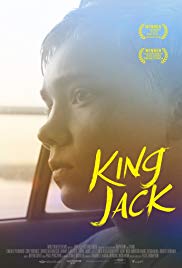
KING JACK
US, 2015, 81 minutes, Colour.
Charlie Plummer, Corey Nichols, Christian Madsen, Danny Flaherty, Erin Davie.
Directed by Felix Thompson.
King Jack is a film about a young boy who is not liked, looked down on by his older brother, cared for by his mother. The action takes place during the summer holidays where he wanders about, bike riding, encountering bullies. He is also friendly with two girls who are caught up in the atmosphere of the older boys and their bullying.
Charlie Plummer, in an early role, is very effective as Jack and indicates further success in All the Money in the World and Lean on Pete.
Complications arise when his cousin, younger than he, is to be looked after while his mother is ill. Jack is unwilling but gradually the two bond, Jack at first unable to save the boy from the bullies, the boy then returning to rescue Jack when he is attacked.
A rather grim slice of life reminding audiences of the reality of bullying.
1. A slice of life? The focus on the young boy who was not liked, bullied? How true the experience?
2. The small town, homes, the summer and vacation, the outdoors around the town, indoors in apartments, parties? The musical score?
3. Charlie Plummer as Jack? A convincing performance? His age, experience? Jack and his father, carrying him, giving him the nickname? The end and Harriet making the paper crown for him and is wearing it on the bicycle? His relationship with his mother, her concern about him? His relationship with his older brother, the slinging off? Alone, on his bicycle, the text about photographing himself, the toilet, sending the photo, it being sent around, his embarrassment? His being pursued and bullied by Shane and his two friends? The brutality? His not being able to stand up for himself?
4. His parents, their characters, his brother, family life? The sister and her illness, the phone call, Ben coming to stay? Jack not wanting to look after him, then age 12, pudgy, awkward? Conversation and lack of conversation? They’re playing together, Ben and his skill at baseball and Jack and skilled? Bike riding? Shane and the slinging off at Ben and his boyfriend? The going to the house with the girls, the language, Truth or Dare, kissing, exposing, Ben exposing, Jack refusing, the issue of the kiss? Shane turning up, their having to escape?
5. The boys running away, their taking Ben, tying him up, the paint balls? Jack and his running away, hiding, challenging them, hurrying to find his brother? Tom turning up, the threats to Shane, the past experience of Tom’s violence, his bashing the television set? Rescuing Ben, Ben upset?
6. Jack, been caught by Shane, upstairs, the girl and the seduction scene, thinking it a joke? Jack and his shorts, the brutal bashing by Shane, everybody coming out, not intervening? Ben and his heading with the baseball? Jack, continually getting up, the final collapse?
7. Jack at home, the police, saying he fell off his bike, Tom with him, Ben and his support? The girls arriving, bringing his clothes home, the paper crown?
8. Jake and Ben, the girls, riding the bike – an eventful summer, the experience of brutality, people standing up for themselves? Creating bonds?
Pray for Rain
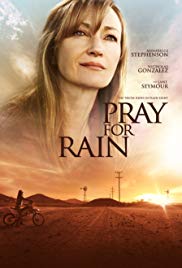
PRAY FOR RAIN
US, 2017, 92 minutes, Colour.
Jane Seymour, Annabelle Stevenson, Nicholas Gonzalez, James Morrison, Paul Rodriguez, Ali Afshar, John Ducey, John Heard.
Directed by Alex Ranarivelo.
Actually there is not much praying for rain but a focus on the harsh repercussions of drought and the rationing of water. The setting is California, perhaps a bit reminiscent of The Grapes of Wrath, water being rationed in a particular zone where farmers have grown abundant food, some accused of stealing water, but rationing decreed because of danger to a particular species of fish. There is a range of environmental enthusiasts, a philanthropist wanting to do the right thing, but a business exploiter who is buying up properties and has a control to turn on the water once he has succeeded. He is also employing rough local gangs.
At the centre of the film is a journalist, seen chatting on a red carpet for an event, getting news of death of her father, coming home, criticised by her mother, wondering about the death of her father. She also meets the local sheriff whom she has known since they were children.
She goes through investigative journalism expose of what is going on. She hears the true story of her mother and father and is reconciled with her mother. Eventually, the FBI intervene and the water issue is channelled into more positive approaches for all concerned.
John Heard’s last film.
1. The blend of crime story and environmental issues?
2. The California setting, the desert, the drought, the vast feels for crops, the town, offices, protests? The musical score?
3. The title, issues of drought in California, conservation of water, rationing of water, stealing water, manipulating property prices, sales, exploitation?
4. The focus on, in New York, the gala premiere and interviews, the pressure from her editor? The phone call, the death of her father, going home? Her strong character? Alienation from her mother, devotion to her father, getting out of California, prospects of a career?
5. Olivia, antagonism towards her daughter, criticisms? The past, her relationship with her husband, the farm, finance, the affair with Patrick? The funeral, the slashing of the tyre and to getting the gun? As a character, the final revelation of the truth about her affair, talking it over with Patrick? The issue of property, selling? Reconciliation with her daughter?
6. The situation, the water diviner, finding the tractor and the body? The verdict of accidental death? Emma, suspicious, interrogating people, the medical records? Visiting the site? The cigar? Suspicions of Patrick? Her collaboration with Nico, knowing him from the past?
7. The environmental protesters, the issue of the species of the fish, the evidence of its not being depleted, the rationing of water, the effect on the farmers and their likelihood, the non-production of food? The speeches, the foundation and Mrs Windemere, wanting to do a good thing? The offices, the visits by Emma, her challenge to them?
8. Patrick Waring, stealing water, selling property, the relationship with Olivia, the information that he was to be the contact for Marcus’s illness and death? Emma confronting him, his playing of the final video, destroying it? Their secret? And the reconciliation with Olivia?
9. The gangs, the thugs, the violent tactics, the confrontation with Olivia at the death site? The further violence, the pursuit, it Emma and the shovel, his arrest?
10. Adam, his fiancee, attitude towards the environment, protests? Mrs Windemere and her wanting to a good thing? The evidence of his adviser exploiting the farmers, getting them to sell, the shell companies? The young farmer and his presence at the protests and explanations? Emma and her evidence, the USB stick, her being abducted and escaping? Calling the FBI, the arrests?
11. The restoring of the water, the farmers and their response, Mrs Windemere?
12. Emma, her background with Nico, the visits, his family, the boy, his father? Sharing the action in the investigations? And a happy ending? And her success with her cover story about the drought?
Joy Luck Club, The
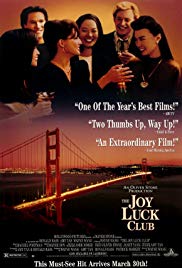
THE JOY LUCK CLUB
US, 1993, 139 minutes, Colour.
Kieu Chinh, Tsai Chin, France Nuyen, Lisa Lu, Ming- Na Wen, Tamlyn Tomita, Lauren Tom, Rosalind Chao, Christopher Rich, Michael Paul Chan, Andrew McCarthy?, Jack Ford, Diane Baker, Victor Wong.
Directed by Wayne Wang.
Amy Tan's novel was a best-seller. She collaborated with screenwriter, Ronald Bass (Rain Man, Snow Falling on Cedars) on the adaptation of her novel for the screen. The structure is a mosaic (or a tapestry) of the stories of four Chinese women. There are flashbacks to their own childhood and their experiences and memories of their mothers. These contrast with the stories of their daughters and their relationships with them. It is a movie of and for mothers.
The four stories set in China in the first half of the twentieth century are more powerful than the more contemporary stories. In fact, these latter seem rather insignificant by comparison. In old China, with its arranged marriages, age-old traditions, the women become victims of society and of the disruption of World War II.
The movie shows how the women succeeded in the United States, became friends, sharing each other's family joys and sorrows and forming their Joy Luck Club to play mahjong. However, the harshness of their childhood and young adulthood still influence the way they bring up their daughters, giving them everything but always setting up unattainably high expectations. The final emotional drama of the movie centres on the mothers allowing their daughters to be themselves.
The cast of mothers is excellent. The performances elicit sympathy for the past and exasperation with the present. The cast of daughters is also very good. But, it is the story of the mothers and their mothers that is the core of the movie.
Direction is by Wayne Wang who made idiosyncratic Chinese-US movies like Dim Sum and Eat a Bowl of Tea and then moved to more mainstream movie-making with Chinese Box and Anywhere But Here.
1. The popularity of the novel? Cinematic adaptation, the contribution of the author? The film of the 1990s?
2. Chinese- American stories? History, traditions, migrations, those fleeing China, the different generations, Chinese and Americans in the 20th century? The Americanising of Chinese migrants and the next generation?
3. China, the range of scenery shown, the different periods, the experience of war, the devastated countryside? Family life and hardships? Wealthy households? High society and wealth? The range of homes? The musical score?
4. The United States, California, the range of apartments, workplaces, libraries, hairdressers, publishers?
5. The club of the title, the women meeting for 30 years, playing Mah Jong, the bonds between them? The different personalities and their interactions? The death of one of their members? June stepping in, keeping up the tradition?
6. The episodic nature of the screenplay, the intercutting of the various stories, the skill of the editing? The voice-overs of the four mothers? The voice-over of the four daughters?
7. The framework of the club, the death, the news about the twins and their story of abandonment, their survival, Lindo and her contact, the letters, the preparation for June to travel, Lindo not telling the twins the mother was dead? The demand on June? Her preparation, the discussions with her father and his amplifying the story? The rival in China, the twins at the airport, older women, the joy of the meeting?
8. June, as a child, her mother’s expectations, given her past loss of her twins, the demands on her daughter, June, unwillingly playing the piano, the benign teacher and his deafness, the recital, her mother’s presence, the failure of the recital? And the comparisons with Waverley in their growing up? Unmarried, the grief at her mother’s death, relationship with her father?
9. June’s mother, the story of her life, the experience of war, illness and dysentery, the migration, telling her story, her husband’s version and amplifying it? Abandoning the children and her grief? Going to the US, marriage, her daughter? Not knowing that her two daughters was still alive? The pathos of the story?
10. Lindo, a very strong woman, in command of the group, the Mah Jong games, the decision about writing to find the twins in China? The background of her own mother, the harsh life, the matchmaker and the family and their plans, her mother agreeing to this, the growing up, grim aspects of her life, at the age of 15, her mother with the family travelling to the south, leaving her? The new household, the grandmother and mother, the severity, the wedding night, Lindo and her marriage, her husband younger than she anticipated, the shock? His ignorance, no sexual encounters? Her being berated by the grandmother for not producing children? Overhearing the maid being pregnant? Concocting her plan, her skill in executing it, the appeal to the Ancestors, the threats, falling out of teeth, death, bringing in the maid, her pregnancy, the upbraiding of the matchmaker, but the solution for the family? Lindo going to the US, tough, with Waverley, Waverley as a chess champion, her rebellion against her mother, her mother giving her the silent treatment? Waverley growing up, the continual disputes, Waverley’s marriage and divorce, the child? Her reaction to Rich, his bravado at the meal and his faux pas? Finally accepting him? The scene in the beauty parlour – and some bonds with her daughter?
11. Waverley, her skill at chess, a reluctance, not being able to take it up again and succeed? Her attitude towards her mother? Marriage and divorce, her own personal success and competence? The relationship with Rich? The clashes with June and the comparisons? Rich and the meal, all his etiquette mistakes?
12. Lena, quiet, seemingly lacking spirit, disappointing her mother? The marriage, Harold and his personality, his manner, the issue of expenses, equal division, to his advantage? Her feeling put down? The decision to stand up to him, defy him? The future of her marriage and her spirit? With the other young women?
13. Lena’s mother, her place in society, expectations, wealth, the style? The suitor, the glamour, the sexual encounter, her pregnancy? The wedding? His continued affairs, blatant? Neglecting her? The treasure of the baby, her husband and the baby and her decision to drown him? The US, her regrets, feeling her daughter lacked spirit?
14. Anna, with her mother, the household, her mother gone, everyone upset, not talking about the mother? The mother’s visit, the revelation of the truth, her being raped, giving birth to the boy? Her taking Anna to the household, Anna’s age, place in the house, the attitude of the wives, the dominance of the second wife, the putdowns? The husband, confrontations, treatment of an? Her telling the truth to her daughter, her decision to kill herself? Her life in America, her strong-minded daughter, the gathering, the cake?
15. Rosalind, strong woman, her studies, Americanised, meeting the publishers, their son, the mother and her racism and her being rebuked by her son? The marriage, love, the birth of the child? Years passing, her desire to please, subjugating her will to his? His exasperation? His work, the affairs? Rosalind and decision to stand up for herself, defying, the change, the reconciliation?
16. The gathering, the whole family together, the family?
Incident in a Ghostland
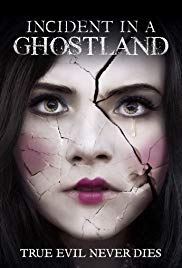
INCIDENT IN A GHOSTLAND
Canada/France, 2018, 91 minutes, Colour.
Crystal Reed, Mylene Farmer, Anastasia Phillips, Emelia Jones, Taylor Hickson, Kevin Power, Rob Archer.
Directed by Pascal Laugier.
French director, Pascal Laugier, made two successful horror films, one in France, Martyrs (deemed rather horrific by fans as well is those put off by the film) and one in the US, The tall Man with Jessica Biel.
This is a Canadian/French production although set in North America, the United States.
In the first 12 minutes of the film, we are introduced to a family, a French mother, the daughter reading out her horror story, her sister taunting her. They have inherited what seems to be something of a haunted house and is the target of home invaders. The invaders attack the women violently.
Then there is a twist, a transition to the story of the writer, now married with a child, the celebrity writer interviewed on television.
There is a further twist when she goes back to the house to see her mother and to care for her sister who is now violently disturbed. The author is subject to nightmares – and what follows, intruders in the house, the author checking her success, violence to the mother and sister, is the stuff of horror nightmares.
1. The director and his horror films? Settings in the countryside? Disturbing countrysides? The roads? Houses?
2. The title, the initial title of Ghos land? The international title adding Incident?
3. The plot, the first part, nightmare, followed by ordinariness, followed by more nightmare and fantasy? A successful blend?
4. The introduction to the mother and daughter is, Beth reading her story, Vera mocking her, the mother and her French background, supporting Beth? The truck passing and giving the finger? Stopping at the diner, the woman recognising them? The newspaper story about the home invasion in the murders? The going to the house, inheriting it? The bizarre interiors, getting the lights going, the dolls, the atmosphere of horror, the basement?
5. The quick introduction of a horror, the home invasion, the brutal big man, the ethereal figure, persecuting the women, the violence, Vera suffering, the impact on the mother, on Beth?
6. The impact of the transition, Beth is a successful writer, her husband and child, doing the television interview, writing the bestseller, the questions as to how much was based on her own experience?
7. Vera’s phone call, the screams, Beth deciding to go home? Encountering her mother, her mother seeming to be ordinary, managing to look after Vera? The contrast with Vera, her mental deterioration, violent episodes, outbreaks?
8. The complications of the story, moving into dreams, Beth in the house, waking, nightmares?
9. The increasing violence, the mysteries about Vera, her illness, mental state, violence, appearing and disappearing? The role of the mother? Beth, the transformations, the effect of Vera? The two selves? The introduction of the visitors, Beth and her stories, reputation? The injuries? The authorities arriving? Beth and her future? Or waking?
10. The effect of this kind of horror and mystery? The French imagination of the writer-director?
Adult Life Skills
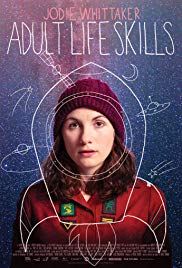
ADULT LIFE SKILLS
UK, 2016, 90 minutes, Colour.
Jodie Whittaker, Lorraine Ashbourne, Brett Goldstein, Eileen Davies, Rachel Deering, Edward Hogg Ozzy Myers.
Directed by Rachel Tunnard.
This film could be something of an acquired taste. It is a film about several generation of women – with some men and a boy character included.
Jodie Whitaker (who was to achieve success in television with Dr Who) is a 30 something who cannot settle down in life, lives an erratic daily existence, helping with some jobs, making videos about meaning in life, working with children, living in a shared owned by her mother, her grandmother also living in the main house.
She does not seem to have adult life skills, continually clashes with her mother, goes to visit prospective houses but rejects them, is interested in the estate agent, Brendan, with whom she grew up and assumed was gay. However, he has always been attracted to her.
The other main character is a little boys whose is in hospital at whom she cares for, playing games, becoming to some awareness of responsibilities.
1. The title? The irony is? Anna and her problems, her markers and rewards? Probing the meaning of life, her videos? Final achievement?
2. The countryside setting, the houses, the sheds, the river, the town, the shops? The British setting? The musical score?
3. Anna’s story, the opening and the thumbs with the eyes and mouth is, the repetition of this imagery in different ways, the thumbs and their dialogue, interactions and the meaning of life? Symbolic of Anna? Her age, approaching 30? Her past, memories of Brendan, his arrival back in the town? The image of the snorkeller and her conversations with him? Living in the hut, her mother’s disapproval, wanting her out? Her grandmother’s house and the caustic remarks of the grandmother? Her sister, friendship, the return, working together? Her disordered life, getting up, dressing, washing in the microwave, cycling, opening the store, the various contacts, the children and the group work? Her arguments with her mother? Not wanting to find a fiancee?
4. Marian, in her mother’s house, the character of her mother, strong remarks, criticisms? Marian and Anna, their arguments, wanted her daughter to achieve something, get out of the shed? The interactions?
5. The sister, her return, the conversations, support?
6. Brendan, the past, people assuming he was gay, his protests? Anna and Marian going to survey houses, his being the agent? His discussions with Anna, explaining himself, the attraction to her? Confidences? Possible future?
7. The snorkeller, appearing, her conversations, his vanishing?
8. Clint, his mother in hospital, the cancer, Marian looking after him, the friendship with Anna, the games with him, the make-believe? Her relating well to him, his changing her?
9. A film for 20 somethings who are still trying to make decisions about their life? A film for audiences like Marian who are concerned about their adult children?
Mean Queen
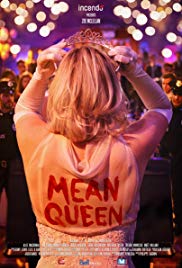
MEAN QUEEN
Canada, 2018, 90 minutes, Colour.
Zoe Mc Clelland, Allie Mac Donald, Niam Roam, Anana Rydvald, Judith Baribeau, Matt Holland, Susan Glover.
Directed by Philippe Gagnon.
This is one of many Canadian thrillers directed by Philippe Gagnon.
With the title, and its reminiscence of Mean Girls, the film is targeted to a female teenage audience. Allie McDonald? is the embodiment of the mean to and, as the screenplay explicitly states, she is a sociopath. All smiles and glamour, she dominates the girls at school, has made insinuations about teachers leading to their being fired, threatens to expose another teacher for assaulting her (which he had not) so that he helps her cheat with exams, and, it emerges that she has abducted another teacher who has threatened to fail her.
Into the situation comes a relief teacher, Zoe Mc Clelland, and her daughter who is in the mean queen’s class but who is taken on by her but, especially, as a means of finding out more about the substitute teacher, her belonging to AA. When she fails her exams again, she starts spreading rumours, upsetting the teacher – all of the time building up to manipulations where she is to achieve her life’s goal, to be Prom Queen.
She despises her mother, is relentless in her sociopathic behaviour, but also behind smiles and charm. She is severe with her own mother – and, eventually, the teacher and her mother find the abducted woman and, of course, her downfall is at the very moment that she has become Prom Queen.
1. The use of mean in the title? Echoes of mean girls? Variation on the theme? The appeal to the target audiences of young teenagers?
2. Canadian production, school, homes? The musical score?
3. Amy, the opening, the vanity of her acceptance speech as Prom Queen? The story of a sociopathic teenager? Her background, father leaving, her working mother, Amy’s resentments, looking down on her mother, on her job, on clothes? A glamorous look? With the peers at school? Dominance? Meanness? The revelation of her treatment of previous teachers, the teacher leaving before being fired, abducting the teacher who was failing her, her blackmailing Mr Peters, her targeting Julie Taylor? Befriending Mia? Insinuating herself, the AA card on the fridge, taking Mia to parties? The maths classes, her boyfriend and sexual advances? Her failure, doing tests again, getting the abducted teacher to write the answers? Keeping the teacher, drugging her? Planting the bottle under the bed? Buying the expensive dress for the prom? Getting near to be on the counting group?
4. Julie Taylor, personality, alcohol problem, AA, separation from her husband, joint custody of their daughter, her relationship with her daughter, the daughter in class, Julian the principal, teaching maths, stern? Suspicions of Amy? Warning her daughter? Giving her permission to go out, the dress shop, too expensive, the 18th birthday? Her conversations with her sponsor? Amy, failing the exam, doing the supplementary, Julie recognising her friends writing? Following Amy in the woods, Amy hitting yourself and accusing Julie, the false report from the sponsor, her daughter believing the full supports, her husband believing them, Miya moving out? The rebuke by the principal? Having to resign? The meetings with Amy’s mother?
5. Miya, 18, caught between her mother and father, sponsored by Amy, believing the criticisms of her mother? Amy not getting the vote, Amy bashing Mia, her mother rescuing her? The reconciliation?
6. Julie, going to Amy’s mother, the discussion, going into the woods, rescuing the teacher, phoning the police?
7. Amy, the announcement, getting the crown, the speech, the police arriving, her being taken, her protest?
8. Audiences watching the credibility of the teenage sociopath and the damage she could wreak?
Little Boxes
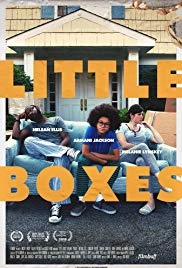
LITTLE BOXES
US, 2016, 84 minutes, Colour.
Melanie Lynskey, Nelsan Ellis, Armani Jackson, Oona Laurence, Janeane Garofalo, Christine Taylor, Miranda McKeon?, Maliq Johnson.
Directed by Rob Meyer.
The title derives from the song about houses like little boxes made of ticky-tack.
This is a film about racism but rather mild in its execution. Melanie Linskey and Nelsan Ellis are a mixed race couple who move from New York City to Washington state for her to take up a new position and for him to write another novel. They have a son played by Armani Jackson.
The wife is welcomed into a University position using her skills in photography. The husband wanders around town and is eventually identified as a published author. The little boy meets up with two young girls, making friends, they having the novelty of a mixed-race friend in their society.
There are many moments of implicit racism, especially with the mother of one of the girls, played by Christine Taylor.
Eventually, it becomes too much for the father which puts burdens on the mother and they want to move out. However, they come to some terms and return to their home.
While this might have some impact for an American audience, especially African- Americans, it seems rather mild in its treatment for a non-American audience.
1. The title? The song and the reference to the little boxes, made of ticky-tack, all being the same? Ironies?
2. New York City, the contrast with Rome, Washington? The small town, nice streets and homes, the college…? The musical score?
3. Race issues, presented more mildly, in the context of suburbia, mindsets and prejudices?
4. Gina, her background, career, the appointment in Washington State? Mack, writer, his published novel? Armani, his age, his parents and race, his being mixed race? The decision to go to Washington as a family? Travel, arrival, settling in?
5. Gina, her photography, welcome to the school, meeting the staff, the introductory lecture, making friendships, her displays?
6. Mack, with time on his hands, going to the bookshop, the owner bringing in his book, recognising him? The neighbour, the neighbourhood committee, the welcome? His wariness, racism beneath the surface?
7. Armani, going out, meeting the two girls, their attitudes and comments about mixed race? Yet his settling in with them, their being precocious, the dances? The mother welcoming them? Ambrosia, her comments and her mother, her mother’s severity?
8. Mack, trying to write, aware of his status, racial background, ripping the paper of the wall, mildew, the wood? The repairs? The phone calls from the truck driver with their possessions? Delayed? Antagonisms? Their finally delivering everything, on the lawn, not in the house?
9. Gina, socials, arriving home late, the issue of the wall, her becoming exasperated, Armani’s behaviour?
10. Armani, going out at night, the stone through the window? The mother, coming to the house, accusing Armani, his parents not believing her? Her past prejudice? Their getting the car, leaving? Armani confessing that he had thrown the stone? The shock for his parents? The returning home, unable to go into the house for some hours because
of the repairs?
11. The seriousness of the race issues? The rather mild treatment?
Changeover, The
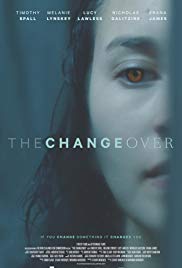
THE CHANGEOVER
New Zealand, 2017, 95 minutes, Colour.
Timothy Spall, Melanie Lynskey, Lucy Lawless, Erana James, Nicholas Galitzine, Kate Harcourt, Benji Purchase.
Directed by Miranda Harcourt, Stuart McKenzie?.
This is a film from New Zealand, set in Christchurch after the destruction by the earthquakes.
Erana James portrays a young girl who has second sight, something like her father who has died. She is being brought up by her mother, played by Melanie Lynskey (after a successful career in Hollywood and returning to her home New Zealand where she made such an impact with Kate Winslet in Peter Jackson’s Heavenly Creatures).
The mysterious presence in the cast is British actor, Timothy Spall, an initially genial man who takes a liking to the heroine’s little brother. This is a world of magic and someone trying to take over another personality. Which means that the heroine who encounters sympathetic members of a carbon has to be transformed so that she can combat the evil doer.
Rather slight in itself but for those who enjoy this kind of magic/which world.
1. An ordinary world? Yet a world of magic, witches and spells?
2. The New Zealand setting, Christchurch as the city, locations, after the earthquake? The musical score?
3. The title, the explanation of what was happening with mortals being taken over?
4. Laura, her age, the background of her father and his magic, at home with her mother, ordinary life, her brother and protecting him? Her being a seer? Sensing of the world beyond?
5. The explanation, her school friends, Sorensen and seeing him at school, mysterious, distrust, then change, attraction towards him?
6. Carmody Braque, his friendship, the gift for her brother, her fear, threatening the police? His continued appearances, knowing about the family, her mother? The boy’s toy? The abduction of her brother?
7. The introduction to the coven, the members of the family, their powers? Sorensen as part of the coven?
8. Carmody exercising his powers, changing, the change in her brother, the change in Laura, his taking them over?
9. Laura, the rituals, wanting to become a witch, reliance on the members of the coven?
10. The transformation, the changeover, her ability to deceive Carmody Braque, defeating him?
11. Meanwhile at the hospital, her mother and concern, her brother, the surgery? His death? Laura arriving, her powers, her brother’s recovery and giving him back to their mother?